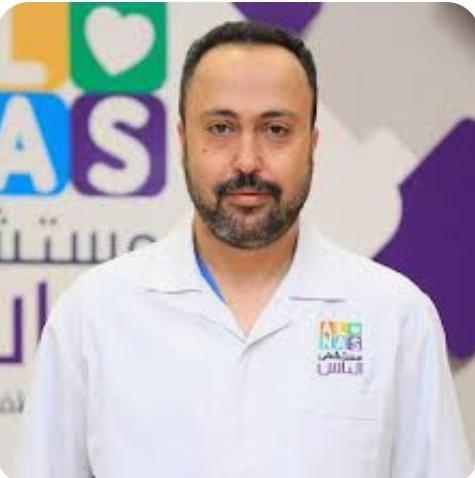Dr. Mahmoud El-Shazly
Ph.D. in Cardiac and Thoracic Surgery
🎓 Cairo University, Kasr Al-Aini Faculty of Medicine
🏥 Abu El-Rish University Hospital
🛠️ Medical Specializations:
💔 Cardiovascular Diseases:
👩⚕️ Heart Diseases in Women:
Diagnosis and treatment of heart diseases that affect women, considering biological and hormonal factors.
⚡ Angina Pectoris:
Diagnosis and treatment of angina caused by coronary artery narrowing, and relief of chest pain resulting from coronary artery stenosis.
📈 High Blood Pressure:
Treatment of hypertension (or pulmonary hypertension) that causes stress on the heart and blood vessels.
🔧 Heart Valve Diseases:
Diagnosis and treatment of heart valve diseases (such as valve leakage or valve stenosis).
🫀 Heart Muscle Dilation (Dilation):
Treatment and follow-up for patients with heart muscle dilation due to conditions like heart failure or infection.
⚠️ Heart Rhythm Disorders:
Treatment of conditions like atrial fibrillation, bradycardia, or tachycardia.
🦠 Endocarditis:
Treatment of inflammation of the heart lining (Endocarditis) caused by bacterial or viral infections.
🩸 Diagnosis and Treatment of Coronary Artery Diseases:
💔 Coronary Artery Diseases:
Treatment of conditions affecting the arteries supplying the heart, such as atherosclerosis and coronary artery stenosis.
🔴 Coronary Artery Insufficiency:
Performing coronary angiography to assess the extent of artery blockages and treat acute insufficiency.
🔄 Post-Stent Placement Follow-up:
Monitoring patients who have received stents in their coronary arteries to ensure no blockages or complications occur.
🔬 Advanced Heart Tests:
📉 Normal ECG:
Performing an electrocardiogram to assess the heart's electrical activity and detect any electrical abnormalities.
🏃♂️ Stress ECG:
A test that measures the heart's activity during physical exertion to monitor the heart's response to exercise.
🌊 Echo (Ultrasound of the Heart):
Evaluating the heart’s internal structure (chamber sizes, valve movement, blood flow through the heart).
🖥️ Holter (Continuous ECG):
A device used to monitor the heart’s electrical activity over 24 to 48 hours to detect irregular heart rhythms.
⚙️ Medical Procedures and Interventions:
💉 Coronary Angiography:
An interventional procedure used to detect blockages in the coronary arteries, with balloon angioplasty or stent placement if necessary.
🤚 Radial Coronary Angiography:
An innovative procedure where the coronary arteries are accessed via the radial artery in the hand instead of the femoral artery in the leg, reducing complications and improving recovery.
🔧 Valve Dilation via Interventional Catheterization:
A procedure to dilate narrowed heart valves using a catheter, avoiding open surgery.
🔍 Managing Complex Cases:
💔 Heart Failure Treatment:
Managing heart muscle weakness (heart failure) that affects the heart's ability to pump blood.
🧑⚕️ Pediatric Heart Diseases:
Treatment of congenital or acquired heart diseases in children.
👨⚕️ Adult Heart Disease Treatment:
Treatment of various heart diseases in adults.
🏥 Intensive Care:
🚑 Critical Heart and Thoracic Cases:
Care for patients with acute problems such as heart attacks or acute heart failure that require intensive monitoring and treatment in an ICU.
📍 Clinic Location:
40 Dokki Street, Dokki Square, Cairo
📱 Contact Numbers:
Mobile Clinic Number: 01118823030
Landline Number: 0237618390
ℹ️ Additional Information:
Dr. Mahmoud El-Shazly is a Consultant in Cardiac and Thoracic Surgery with extensive experience in managing complex cases that require advanced therapeutic techniques. Dr. El-Shazly offers services in diagnosing and treating heart diseases using the latest medical technologies, with a focus on personalized care and long-term health monitoring for patients.

